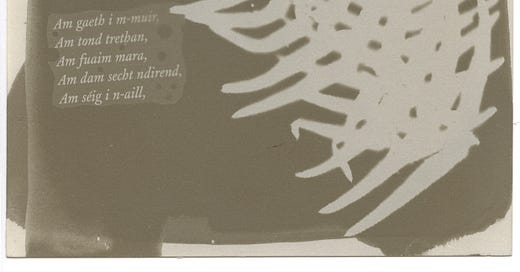Paul has accepted a wee tweak to our project’s rules, which is to permit a “lateral move” in the poet’s collection – up or down the page, or from one side of the page spread to the other. His selections in the first-round of “The Level Crossing” and in second-round of “The Diamond” – poems on facing pages of “The Weather in Japan” – combined with my belief that a poet mindfully sequences their collection – revealed to me a remaining third poem of Longley’s page spread, an elegy entitled “Leaving Atlanta”:
And the animals combining underground, overhead,
Wherever the mind goes in the small hours, at sunrise.
So my own selection for our third round is DeFlitch’s “Garbage Night”, about a space of time on the other side of midnight:
I am waking all the days.
I am the ferns, and I keep space for you
for the coffee cups.
DeFlitch seems to reach for a register one hears amongst a lot of “I am” poems, one of the most famous perhaps being “Song of Amergin”. This poem is attributed to a king leading the mythical peoples who invaded Ireland by defeating the Tuatha Dé Danann and forcing them to live underground (and who by going into the earth therefore became the Aos Sí – the fairy folk). Amergin is also a druid and has defeated the Tuatha with the help of some magic, and speaks the words of his song as he sets foot on Ireland in victory, beginning with:
I am the wind on the sea
I am the wave of the sea
And yet “Garbage Night” reaches through the epic of a woman worrying for her aging parents, for her dog that needs to go out to take a pee, for a truck filled with detritus that is plainly garbage but which still has meaning. The glorious moment, though, is when she heads out into the warm evening and simply lies down on the warm pavement, the skin of her back sticking to the asphalt:
to watch the stars come out
in real soaring spires above my head
until the dog begins her howling.
Gosh, when was the last time I lay down on summer’s grass to look straight up?
For me, “Garbage Night” is a record of the poet’s victory of snatching that lyric moment from a night noised by worries. Longley’s lyric is far more condensed and compressed, yet DeFlitch is aiming in the right direction (IMHO).
My image for “Garbage Night” is a cyanotype with ferns from around my home, plus some words from “The Song of Amergin” in English translation and the Middle Irish — and all of this toned with coffee after a good bleach in sodium carbonate. Serendipity or bad technique or both created the surf washing up the edges of the paper. It is my attempt to capture some of the contradictions amongst the epic and the lyric in “Garbage Night”.




Thanks for the reminder to take time and lie on the ground and look up, or just feel the ground below... on the 'to do' list!